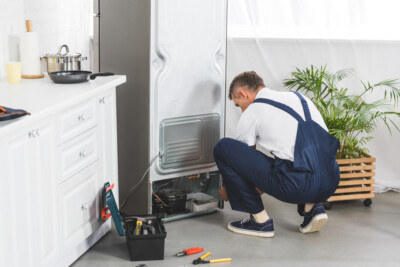My Refrigerator Is Freezing My Food?
If your refrigerator freezes food, there may be several problems. In particular, bottom freezers can cause a lot of freezing problems in the refrigerator. In models with a freezer compartment, food may freeze at the bottom of the refrigerator. In deep-freezer refrigerators, heat rises in the refrigerator compartment, and the bottom is usually the coldest part.
The end result is that the refrigerator compartment becomes too cold, causing the food in the refrigerator to freeze. Some problems can cause food in the refrigerator to freeze unexpectedly. When the refrigerator freezes food, the damper may be damaged or stuck in the open position. If the flapper door is stuck in the open position, the constant flow of cold air can freeze food in the refrigerator.
If refrigerators are relatively empty, all the cold air will sink to the bottom of the cavity and freeze food. If food blocks these vents, it will be exposed to more cold air and may freeze over time. Food near the vents may freeze as the refrigerator tries to maintain the set temperature while expelling cold air.
In a refrigerator, it should stop working automatically as soon as the set temperature is reached. The thermostat is designed to automatically stop working as soon as the refrigerator reaches the set temperature. Return the thermostat to the manufacturer’s recommended setting and wait approximately 24 hours for the temperature in the refrigerator to stabilize.
Find a refrigerator thermometer to provide a more accurate temperature reading and leave it on overnight. If food continues to freeze, place a separate thermometer in the refrigerator for more accurate readings.
If your food is still freezing even after you’ve increased the temperature settings, try to identify the area of the refrigerator where this is happening. If you have adjusted the temperature sensor in the refrigerator and rearranged the food, but the problem persists, check the temperature in the freezer. If your refrigerator is freezing food, try replacing the temperature sensor, rearranging the food, adjusting the freezer temperature, checking the magnets, cleaning the coils, replacing the thermostat, or checking the damper.
It also over-cools the refrigerator, which can cause frozen food to freeze. The problem may not be with the refrigerator at all, but with the refrigerator being too cold.
This is a common problem and many people wonder why they have frozen food in their refrigerator. Also, frozen food in your refrigerator may indicate that your refrigerator is broken, which is a headache no one wants to deal with. A faulty refrigerator can cause a lot of problems, especially when your appliance starts to freeze your excellent foods.
Before you tear your hair out and curse the refrigerator manufacturer, there are a number of steps you can take to prevent food from freezing accidentally. If you’re tired of defrosting dairy products or deicing fresh vegetables only to find them woefully wilted, you should look into these causes of frozen food in your refrigerator’s fresh compartment. Another reason you might experience sub-zero temperatures in the fresh food section could be damper control.
Normally about 20% gets into the fresh food section, but if the automatic shutter gets stuck open for one reason or another, more air can get into the fresh food and the temperature drops dramatically. If the food closest to the door stays at a safe temperature, raising the temperature in the fresh food compartment by one degree can prevent freezing.
Directs is how the temperature controller cools the air in the refrigerator if it gets too high. The thermistor will send a reading to the temperature control board in the refrigerator, in turn sending voltage to the components of the refrigerant system. Enter lowers the temperature in the refrigerator, allowing food and drinks to overcool and then freeze. The damper is, in fact, the assembly needed to regulate the amount of chilled air entering the refrigerator from the refrigerator-freezer.
If the damper is not working properly, it can create excess airflow into the refrigerator compartment, causing the temperature to drop gradually. If the damper door is open or the damper control assembly is defective, you will need to replace this component to prevent the refrigerator from staying too cold causing food in the bottom chamber to freeze. If the air damper is not working properly, the refrigerator may become too cold, causing the food inside to freeze and become inedible. If the air damper control does not work properly, it may cause the temperature to be set incorrectly, resulting in frozen vegetables in the refrigerator drawers or other possible icing inside the refrigerator compartments.
The choke control opens/closes to circulate the correct amount of cold air into the refrigerator. If there is not much food in a well-stocked refrigerator, cold air sinks to the bottom of the refrigerator, so keep it full but not too full or food may not cool properly.
Unfortunately, work can lead to a too cold refrigerator and frozen food. If the thermostat is not working properly, it will cause the compressor to run more than it should, which in turn causes food to freeze and the refrigerator to empty. If the thermostat is defective, it may not turn off and continue to operate, causing the refrigerator to freeze everything stored in it.
To schedule refrigerator repairs in Oklahoma City be sure and contact Appliance Repair OKC Services by calling 405-378-4566 or visit our website at https://www.okcappliance.com or alternatively our Google business website at https://cutt.ly/YEnc8qk. Call now!
The post My Refrigerator Is Freezing My Food? appeared first on Appliance Repair OKC Services | Best Appliance, Washing Machine Repair Company in Oklahoma.


No comments:
Post a Comment